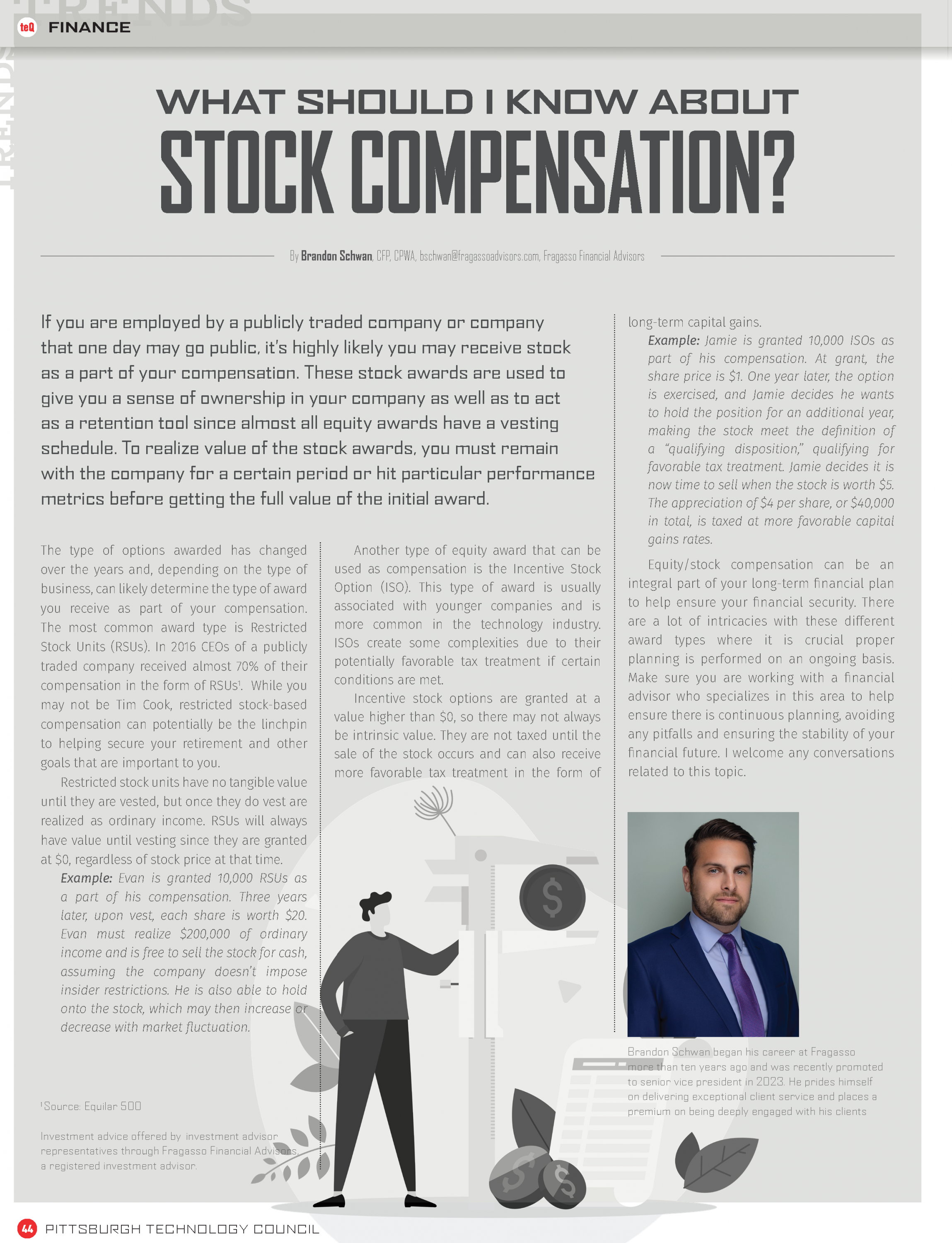What Should I Know About Stock Compensation?
By Brandon Schwan, CFP, CPWA, Fragasso Financial Advisors
 If you are employed by a publicly traded company or company that one day may go public, it’s highly likely you may receive stock as a part of your compensation. These stock awards are used to give you a sense of ownership in your company as well as to act as a retention tool since almost all equity awards have a vesting schedule. To realize value of the stock awards, you must remain with the company for a certain period or hit particular performance metrics before getting the full value of the initial award.
If you are employed by a publicly traded company or company that one day may go public, it’s highly likely you may receive stock as a part of your compensation. These stock awards are used to give you a sense of ownership in your company as well as to act as a retention tool since almost all equity awards have a vesting schedule. To realize value of the stock awards, you must remain with the company for a certain period or hit particular performance metrics before getting the full value of the initial award.
The type of options awarded has changed over the years and, depending on the type of business, can likely determine the type of award you receive as part of your compensation. The most common award type is Restricted Stock Units (RSUs). In 2016 CEOs of a publicly traded company received almost 70% of their compensation in the form of RSUs1. While you may not be Tim Cook, restricted stock-based compensation can potentially be the linchpin to helping secure your retirement and other goals that are important to you.
Restricted stock units have no tangible value until they are vested, but once they do vest are realized as ordinary income. RSUs will always have value until vesting since they are granted at $0, regardless of stock price at that time.
Example: Evan is granted 10,000 RSUs as a part of his compensation. Three years later, upon vest, each share is worth $20. Evan must realize $200,000 of ordinary income and is free to sell the stock for cash, assuming the company doesn’t impose insider restrictions. He is also able to hold onto the stock, which may then increase or decrease with market fluctuation.
Another type of equity award that can be used as compensation is the Incentive Stock Option (ISO). This type of award is usually associated with younger companies and is more common in the technology industry. ISOs create some complexities due to their potentially favorable tax treatment if certain conditions are met.
Incentive stock options are granted at a value higher than $0, so there may not always be intrinsic value. They are not taxed until the sale of the stock occurs and can also receive more favorable tax treatment in the form of long-term capital gains.
Example: Jamie is granted 10,000 ISOs as part of his compensation. At grant, the share price is $1. One year later, the option is exercised, and Jamie decides he wants to hold the position for an additional year, making the stock meet the definition of a “qualifying disposition,” qualifying for favorable tax treatment. Jamie decides it is now time to sell when the stock is worth $5. The appreciation of $4 per share, or $40,000 in total, is taxed at more favorable capital gains rates.
Equity/stock compensation can be an integral part of your long-term financial plan to help ensure your financial security. There are a lot of intricacies with these different award types where it is crucial proper planning is performed on an ongoing basis. Make sure you are working with a financial advisor who specializes in this area to help ensure there is continuous planning, avoiding any pitfalls and ensuring the stability of your financial future. I welcome any conversations related to this topic.
Brandon Schwan began his career at Fragasso more than ten years ago and was recently promoted to senior vice president in 2023. He prides himself on delivering exceptional client service and places a premium on being deeply engaged with his clients